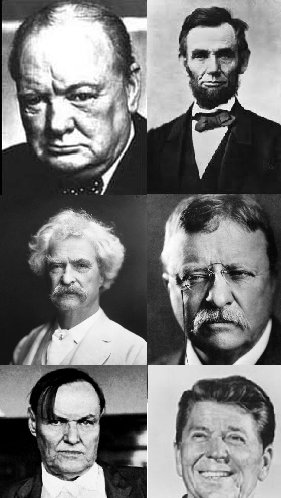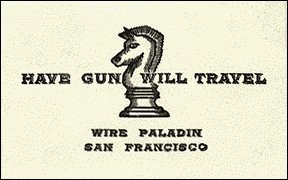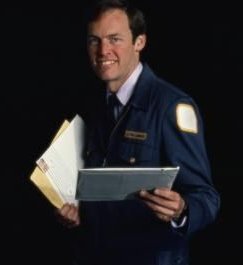BRYCE ON COMMUNICATIONS
- It's not just what they said, but how they connected with you.
(Click for
AUDIO VERSION)
To use this segment in a Radio broadcast or Podcast, send TIM a request.

I have been a student of communications for most of my life, not just the media but how and why things are spoken. Not surprising, I am often asked who my favorite orators were. Most are politicians as the spoken word represents their bread and butter. I have six favorites who I would define as
"Great Communicators": Winston Churchill, Abraham Lincoln, Samuel Clemens (Mark Twain), Theodore Roosevelt, Clarence Darrow, and Ronald Reagan. All had witty one liners, but they also knew how to deliver an important speech. In addition, all believed in preparation and rehearsal, and all spoke from the heart. Here are my favorites:
WINSTON CHURCHILL - was perhaps the best orator I've studied. Some of his histrionics in Parliament became legendary. For example, when an opponent was speaking, Churchill would divert attention away from him doing nothing more than searching his pockets for an unknown object he never could find. While the speaker was trying to make his point, the audience's eyes were fixed on Winston. His quips could be both biting and witty.
"Any 20 year-old who isn't a liberal doesn't have a heart, and any 40 year-old who isn't a conservative doesn't have a brain."
Lady Nancy Astor: "Winston, if you were my husband, I'd poison your tea."
Churchill: "Nancy, if I were your husband, I'd drink it."
George Bernard Shaw message to Churchill: "I am enclosing two tickets to the first night of my new play; bring a friend... If you have one."
Churchill's response: "Cannot possibly attend first night, will attend second, if there is one."
Churchill's orations were well known, both before and after serving as the Prime Minister of Britain. For example, he coined the expression "Iron Curtain" in reference to the menacing growth of the Soviet Union. However, the three speeches he delivered as he began his tenure as PM are generally regarded as his finest as they stirred the British resolve to press on:
"I would say to the House as I said to those who have joined this government: I have nothing to offer but blood, toil, tears and sweat. We have before us an ordeal of the most grievous kind. We have before us many, many long months of struggle and of suffering... You ask, what is our aim? I can answer in one word: Victory. Victory at all costs — Victory in spite of all terror — Victory, however long and hard the road may be, for without victory there is no survival." - May 10, 1940
"We shall fight in France, we shall fight on the seas and oceans, we shall fight with growing confidence and growing strength in the air, we shall defend our island, whatever the cost may be. We shall fight on the beaches, we shall fight on the landing grounds, we shall fight in the fields and in the streets, we shall fight in the hills; we shall never surrender, and if, which I do not for a moment believe, this island or a large part of it were subjugated and starving, then our Empire beyond the seas, armed and guarded by the British Fleet, would carry on the struggle, until, in God's good time, the New World, with all its power and might, steps forth to the rescue and the liberation of the old." - June 4, 1940
"What General Weygand has called the Battle of France is over. The Battle of Britain is about to begin. Upon this battle depends the survival of Christian civilization. Upon it depends our own British life, and the long continuity of our institutions and our Empire. The whole fury and might of the enemy must very soon be turned on us. Hitler knows that he will have to break us in this island or lose the war. If we can stand up to him, all Europe may be freed and the life of the world may move forward into broad, sunlit uplands. But if we fail, then the whole world, including the United States, including all that we have known and cared for, will sink into the abyss of a new dark age made more sinister, and perhaps more protracted, by the lights of perverted science. Let us therefore brace ourselves to our duties, and so bear ourselves, that if the British Empire and its Commonwealth last for a thousand years, men will still say, This was their finest hour." - June 18, 1940
ABRAHAM LINCOLN - Although America's 16th President was well known for his humorous storytelling, he could also deliver some pointed remarks with a dramatic flair:
"Better to remain silent and be thought a fool than to speak out and remove all doubt."
"America will never be destroyed from the outside. If we falter and lose our freedoms, it will be because we destroyed ourselves."
His Gettysburg Address in 1863 was nearly overlooked by the media as it was short and simple. His slection of words though captured the country's imagination, e.g.,; "Four score and seven years ago our fathers brought forth on this continent a new nation, conceived in liberty, and dedicated to the proposition that all men are created equal."
It was a good speech and suited the day, but perhaps his most important speech was from his second inauguration as the end of the Civil War was in sight: "With malice toward none; with charity for all; with firmness in the right, as God gives us to see the right, let us strive on to finish the work we are in; to bind up the nation’s wounds; to care for him who shall have borne the battle, and for his widow, and his orphan—to do all which may achieve and cherish a just, and a lasting peace, among ourselves, and with all nations." - March 4, 1865
SAMUEL CLEMENS (MARK TWAIN) - the author was well known for his humorous observations....
"Suppose you were an idiot. And suppose you were a member of Congress. But I repeat myself..."
"If you don't read the newspaper you are uninformed, if you do read the newspaper you are misinformed."
...But Clemens also had a serious side; here he comments on the meaning of life:
"A myriad of men are born; they labor and sweat and struggle for bread; they squabble and scold and fight; they scramble for little mean advantages over each other. Age creeps upon them; infirmities follow; shames and humiliations bring down their prides and their vanities. Those they love are taken from them and the joy of life is turned to aching grief. The burden of pain, care, misery, grows heavier year by year. At length ambition is dead; pride is dead; vanity is dead; longing for release in their place. It comes at last - and they vanish from a world where they were of no consequence; where they achieved nothing; where they were a mistake and a failure and a foolishness; will lament them a day and forget them forever. Then another myriad takes their place and copies all they did and goes along the same profitless road and vanishes as they vanished - to make room for another and another and a million other myriads to follow the same arid path through the same desert and accomplish what the first myriad and all the myriads that came after it accomplished - nothing!"
THEODORE ROOSEVELT - America's 26th president was no funnyman, but his enthusiasm was contagious and invigorated the country.
“Speak softly and carry a big stick; you will go far.”
“When you're at the end of your rope, tie a knot and hold on.”
“To announce that there must be no criticism of the President, or that we are to stand by the President, right or wrong, is not only unpatriotic and servile, but is morally treasonable to the American public.”
When addressing a somber subject, he presented his argument in a "matter-of-fact" tone:
“In the first place, we should insist that if the immigrant who comes here in good faith becomes an American and assimilates himself to us, he shall be treated on an exact equality with everyone else, for it is an outrage to discriminate against any such man because of creed, or birthplace, or origin. But this is predicated upon the person's becoming in every facet an American, and nothing but an American...There can be no divided allegiance here. Any man who says he is an American, but something else also, isn't an American at all. We have room for but one flag, the American flag... We have room for but one language here, and that is the English language... and we have room for but one sole loyalty and that is a loyalty to the American people.”
CLARENCE DARROW - well known American defense lawyer who served in some of the most electrifying cases of the early 20th century, including the Leopold and Loeb case, and the Scopes "Monkey" Trial. His wit was legendary:
"The first half of our lives are ruined by our parents and the second half by our children."
“I've never killed a man, but I've read many an obituary with a great deal of satisfaction.”
"The trouble with law is lawyers."
His arguments were notoriously logical and superbly delivered. In fact, a considerable portion of his courtroom oratory in the Scopes Trial was used in the movie, "Inherit the Wind" which portrayed the trial. During the case, Darrow argued:
"If today you can take a thing like evolution and make it a crime to teach it in the public school, tomorrow you can make it a crime to teach it in the private schools, and the next year you can make it a crime to teach it to the hustings or in the church. At the next session you may ban books and the newspapers. Soon you may set Catholic against Protestant and Protestant against Protestant, and try to foist your own religion upon the minds of men. If you can do one you can do the other. Ignorance and fanaticism is ever busy and needs feeding. Always it is feeding and gloating for more. Today it is the public school teachers, tomorrow the private. The next day the preachers and the lectures, the magazines, the books, the newspapers. After a while, your honor, it is the setting of man against man and creed against creed until with flying banners and beating drums we are marching backward to the glorious ages of the sixteenth century when bigots lighted fagots to burn the men who dared to bring any intelligence and enlightenment and culture to the human mind." - July 13, 1925
RONALD REAGAN - Because of his ability to connect with Americans, our 40th President was dubbed "The Great Communicator" thanks in large part to his early work as a Hollywood actor. He enjoyed excellent stage presence and could effectively deliver a speech, whether he wrote it or not. His quips were politically motivated as opposed to trivial observations...
"Man is not free unless government is limited."
"The problem is not that people are taxed too little, the problem is that government spends too much."
"We must reject the idea that every time a law's broken, society is guilty rather than the lawbreaker. It is time to restore the American precept that each individual is accountable for his actions."
His Berlin speech is generally regarded as his best:
"There is one sign the Soviets can make that would be unmistakable, that would advance dramatically the cause of freedom and peace. General Secretary Gorbachev, if you seek peace, if you seek prosperity for the Soviet Union and eastern Europe, if you seek liberalization, come here to this gate. Mr. Gorbachev, open this gate. Mr. Gorbachev, Mr. Gorbachev, tear down this wall!" - June 12, 1987
To me, his speeches made at the 40th Anniversary of the Normandy Invasion in 1984, was his most personal and touching.
"Lisa Zanatta Henn began her story by quoting her father, who promised that he would return to Normandy. She ended with a promise to her father, who died 8 years ago of cancer: I'm going there, Dad, and I'll see the beaches and the barricades and the monuments. I'll see the graves, and I'll put flowers there just like you wanted to do. I'll feel all the things you made me feel through your stories and your eyes. I'll never forget what you went through, Dad, nor will I let anyone else forget. And, Dad, I'll always be proud.
Through the words of his loving daughter, who is here with us today, a D-Day veteran has shown us the meaning of this day far better than any President can. It is enough for us to say about Private Zanatta and all the men of honor and courage who fought beside him four decades ago: We will always remember. We will always be proud. We will always be prepared, so we may always be free."
What made these people great communicators is not any flowery oratory, but their ability to craft and deliver the right words to connect with their audiences. They knew how to touch people, inspire them, and move them in the direction they wanted.
Keep the Faith!
Note: All trademarks both marked and unmarked belong to their respective companies.
Copyright © 2013 by Tim Bryce. All rights reserved.
NEXT UP: A LITTLE STUG - A simple little word that means a lot, at least to me.
Listen to Tim on WJTN-AM (News Talk 1240) "The Town Square" with host John Siggins (Mondays, Wednesdays, Fridays, 12:30-3:00pm ET), and KGAB-AM 650 "The Morning Zone" with host Dave Chaffin (weekdays. 6:00-10:00am MST). Or tune-in to Tim's channel on YouTube.(NEW)
Also look for Tim's postings in the
Palm Harbor Patch,
The Gentlemen's Association, and throughout the Internet.
 Now and then I am reminded of an old medicine I haven't heard about in a long time. I'm usually surprised they're still around as I thought they were made obsolete. Then again, such medicines still work and are used by loyal consumers with strong allegiances. For example, one of my neighbors confided in me she takes a tablespoon of Castor Oil on a daily basis. I was surprised by the admission as I hadn't heard of it since my youth, which I remember as some nasty tonic that doesn't go down too easily. My neighbor said the taste wasn't too bad after you get used to it. Actually, Castor Oil has several uses, one of which is medicinal in nature, primarily as a laxative "to keep you regular."
Now and then I am reminded of an old medicine I haven't heard about in a long time. I'm usually surprised they're still around as I thought they were made obsolete. Then again, such medicines still work and are used by loyal consumers with strong allegiances. For example, one of my neighbors confided in me she takes a tablespoon of Castor Oil on a daily basis. I was surprised by the admission as I hadn't heard of it since my youth, which I remember as some nasty tonic that doesn't go down too easily. My neighbor said the taste wasn't too bad after you get used to it. Actually, Castor Oil has several uses, one of which is medicinal in nature, primarily as a laxative "to keep you regular."
 Tim Bryce is a writer and the Managing Director of M&JB Investment Company (M&JB) of Palm Harbor, Florida and has over 30 years of experience in the management consulting field. He can be reached at timb001@phmainstreet.com
Tim Bryce is a writer and the Managing Director of M&JB Investment Company (M&JB) of Palm Harbor, Florida and has over 30 years of experience in the management consulting field. He can be reached at timb001@phmainstreet.com I recently read an article claiming Tango dancing was an effective means to eliminate stress and depression. Evidently there is something about the legendary South American dance exhilarating to the human spirit. Maybe it has something to do with restoring confidence. Afterwards, it occurred to me this might just be the tonic needed to lift the country out of the doldrums we are in.
I recently read an article claiming Tango dancing was an effective means to eliminate stress and depression. Evidently there is something about the legendary South American dance exhilarating to the human spirit. Maybe it has something to do with restoring confidence. Afterwards, it occurred to me this might just be the tonic needed to lift the country out of the doldrums we are in.
 Years ago I happened to see a copy of Amelia Earhhart's business card. It was actually quite simple and included nothing more than her name and title, "Aviator." There was no address or anything else, and I suspect it was used merely to introduce her to people, a "calling card" if you will. In an old CBS western starring Richard Boone, the main character also had a simple business card which included a reference to his line of work, "Have Gun, Will Travel," along with "Wire Paladin, San Francisco." Also included was an image of a chess piece, a knight to be precise, presumably a symbolic touch of class.
Years ago I happened to see a copy of Amelia Earhhart's business card. It was actually quite simple and included nothing more than her name and title, "Aviator." There was no address or anything else, and I suspect it was used merely to introduce her to people, a "calling card" if you will. In an old CBS western starring Richard Boone, the main character also had a simple business card which included a reference to his line of work, "Have Gun, Will Travel," along with "Wire Paladin, San Francisco." Also included was an image of a chess piece, a knight to be precise, presumably a symbolic touch of class.
 I hate colds. I can usually sense when they are coming on, be it in my throat, nose, eyes, ears, or even lips. I immediately take some preventative medicine. Sometimes it works, sometimes it doesn't. If the cold really wants to bloom, I find there is no stopping it. I believe it has a mind of its own. I can go a long time between colds, but when I finally get one, it's usually a real beaut.
I hate colds. I can usually sense when they are coming on, be it in my throat, nose, eyes, ears, or even lips. I immediately take some preventative medicine. Sometimes it works, sometimes it doesn't. If the cold really wants to bloom, I find there is no stopping it. I believe it has a mind of its own. I can go a long time between colds, but when I finally get one, it's usually a real beaut.
 The concept of leaders and followers is as old as mankind where one person champions a path for others to follow. Leaders believe they possess the knowledge and skills to take their followers to the promised land. They do this for several reasons: compassion for others, ego, greed, or it is simply their job to do so, as in business. Followers are searchers, be it for knowledge, truth, direction, or because they have no alternative. People will follow leaders either willfully, reluctantly, or by coercion, such as by threat of punishment. It depends on the follower's perception of their leader. They either have confidence in the leader's ability and trust his judgement without question, they lack confidence but are willing to follow, or are resigned to their fate.
The concept of leaders and followers is as old as mankind where one person champions a path for others to follow. Leaders believe they possess the knowledge and skills to take their followers to the promised land. They do this for several reasons: compassion for others, ego, greed, or it is simply their job to do so, as in business. Followers are searchers, be it for knowledge, truth, direction, or because they have no alternative. People will follow leaders either willfully, reluctantly, or by coercion, such as by threat of punishment. It depends on the follower's perception of their leader. They either have confidence in the leader's ability and trust his judgement without question, they lack confidence but are willing to follow, or are resigned to their fate.
 I was recently invited to bid on a technical writing project. The initial meeting was treated like a job interview to determine my qualifications and everything seemed to go smoothly. Evidently I passed the test as I was invited for a second interview to discuss the project assignment in more detail. I arrived at the company's offices a few minutes ahead of schedule (11:00am). Nobody was at the front desk so I took a seat in their waiting room along with another gentleman who I judged to be approximately the same age as myself. We exchanged pleasantries and I soon discovered he was also invited to bid on the same assignment. I was dressed in suit and tie for the appointment, and my competitor was dressed in "business casual." Actually, we developed a good dialog about who we were and where we were from. There was no animosity between us, just some friendly banter.
I was recently invited to bid on a technical writing project. The initial meeting was treated like a job interview to determine my qualifications and everything seemed to go smoothly. Evidently I passed the test as I was invited for a second interview to discuss the project assignment in more detail. I arrived at the company's offices a few minutes ahead of schedule (11:00am). Nobody was at the front desk so I took a seat in their waiting room along with another gentleman who I judged to be approximately the same age as myself. We exchanged pleasantries and I soon discovered he was also invited to bid on the same assignment. I was dressed in suit and tie for the appointment, and my competitor was dressed in "business casual." Actually, we developed a good dialog about who we were and where we were from. There was no animosity between us, just some friendly banter.
 Aside from a few fillings when I was young, I have been blessed with some rather good teeth. Year-in and year-out I've dutifully visited my dentist for cleanings and have kept them in good shape. On a recent visit though, my dental hygienist found I had broken a back molar thereby requiring a crown. To dentists, this is like hitting pay-dirt as I discovered crowns can be an expensive proposition. It's not uncommon to pay in excess of $1,000 for a crown. Fortunately, I was covered by dental insurance, which brought the out-of-pocket expense down considerably, but I was mindful how expensive the procedure can be. Many years ago, it wasn't too expensive, but inflation and the technology of the 21st century changed all that.
Aside from a few fillings when I was young, I have been blessed with some rather good teeth. Year-in and year-out I've dutifully visited my dentist for cleanings and have kept them in good shape. On a recent visit though, my dental hygienist found I had broken a back molar thereby requiring a crown. To dentists, this is like hitting pay-dirt as I discovered crowns can be an expensive proposition. It's not uncommon to pay in excess of $1,000 for a crown. Fortunately, I was covered by dental insurance, which brought the out-of-pocket expense down considerably, but I was mindful how expensive the procedure can be. Many years ago, it wasn't too expensive, but inflation and the technology of the 21st century changed all that.
 The United States Postal Service (USPS) recently announced it is going to suspend Saturday deliveries of mail. Actually, we shouldn't be too surprised as paper based mail has been diminishing over the years, thanks to e-mail, electronic banking, and rising postal costs. I know many businesses who avoid the USPS as much as possible and prefer the service of other carriers instead. All of this adds up to a decline in revenues and an increase in expenses for the USPS who is now scrambling to reorganize themselves in order to survive.
The United States Postal Service (USPS) recently announced it is going to suspend Saturday deliveries of mail. Actually, we shouldn't be too surprised as paper based mail has been diminishing over the years, thanks to e-mail, electronic banking, and rising postal costs. I know many businesses who avoid the USPS as much as possible and prefer the service of other carriers instead. All of this adds up to a decline in revenues and an increase in expenses for the USPS who is now scrambling to reorganize themselves in order to survive.
 As a small businessman, I haven't had to use a fax machine in quite some time. Like most people these days, I rely primarily on e-mail. If I have a lengthy document, I convert it to a PDF file and attach it to the e-mail. Many years ago, we relied heavily on fax machines to communicate with customers overseas (and TWX machines before that), but in recent times we have little use for such devices. We keep a fax machine in the office for "just in case" situations, but we mostly leave it unplugged to avoid the many spam faxes still plaguing the public. I am also able to interface with other systems to upload/download data in a variety of file formats with Delimited ASCII being the most prevalent.
As a small businessman, I haven't had to use a fax machine in quite some time. Like most people these days, I rely primarily on e-mail. If I have a lengthy document, I convert it to a PDF file and attach it to the e-mail. Many years ago, we relied heavily on fax machines to communicate with customers overseas (and TWX machines before that), but in recent times we have little use for such devices. We keep a fax machine in the office for "just in case" situations, but we mostly leave it unplugged to avoid the many spam faxes still plaguing the public. I am also able to interface with other systems to upload/download data in a variety of file formats with Delimited ASCII being the most prevalent.
 I am a sucker for reruns. I love to watch an old movie, maybe because I'm not too impressed with what Hollywood is churning out these days. For example, I recently watched
I am a sucker for reruns. I love to watch an old movie, maybe because I'm not too impressed with what Hollywood is churning out these days. For example, I recently watched  I have always been fascinated by the disparity between liberals and conservatives, particularly as witnessed in the last electoral cycle. The contrast is as sharp as black and white. It's as if two different races of people occupy the land with totally different perspectives and values. I'm not sure why this is, but I want to give my two cents on the subject.
I have always been fascinated by the disparity between liberals and conservatives, particularly as witnessed in the last electoral cycle. The contrast is as sharp as black and white. It's as if two different races of people occupy the land with totally different perspectives and values. I'm not sure why this is, but I want to give my two cents on the subject.
 On more than one occasion I have been complimented on my ability to get things done. As such, I am often asked my secret to success. I normally reply, "A little Stug," a rather simple expression requiring an explanation.
On more than one occasion I have been complimented on my ability to get things done. As such, I am often asked my secret to success. I normally reply, "A little Stug," a rather simple expression requiring an explanation.
 I have been a student of communications for most of my life, not just the media but how and why things are spoken. Not surprising, I am often asked who my favorite orators were. Most are politicians as the spoken word represents their bread and butter. I have six favorites who I would define as "Great Communicators": Winston Churchill, Abraham Lincoln, Samuel Clemens (Mark Twain), Theodore Roosevelt, Clarence Darrow, and Ronald Reagan. All had witty one liners, but they also knew how to deliver an important speech. In addition, all believed in preparation and rehearsal, and all spoke from the heart. Here are my favorites:
I have been a student of communications for most of my life, not just the media but how and why things are spoken. Not surprising, I am often asked who my favorite orators were. Most are politicians as the spoken word represents their bread and butter. I have six favorites who I would define as "Great Communicators": Winston Churchill, Abraham Lincoln, Samuel Clemens (Mark Twain), Theodore Roosevelt, Clarence Darrow, and Ronald Reagan. All had witty one liners, but they also knew how to deliver an important speech. In addition, all believed in preparation and rehearsal, and all spoke from the heart. Here are my favorites: